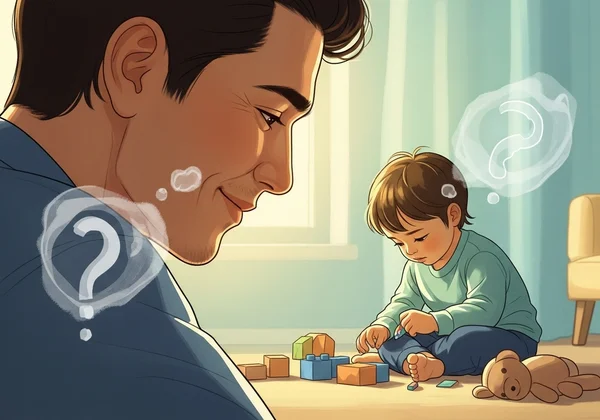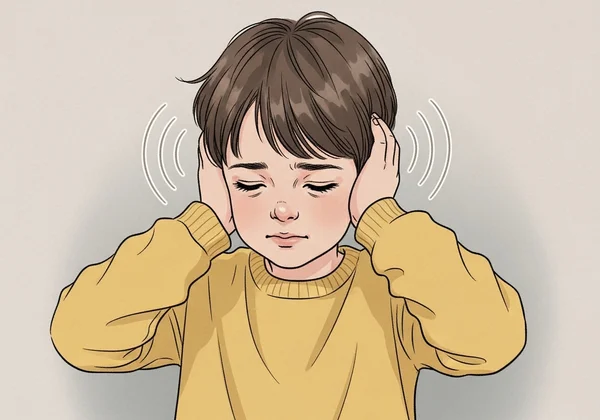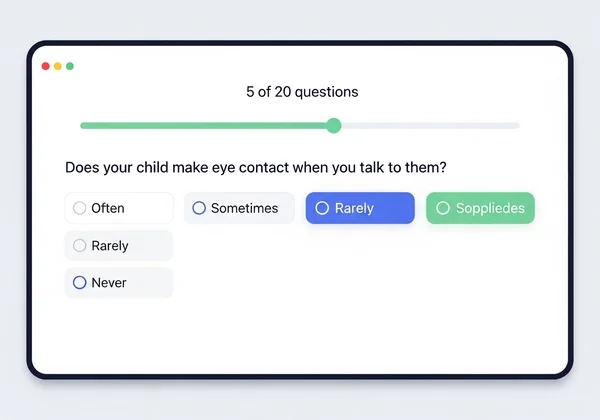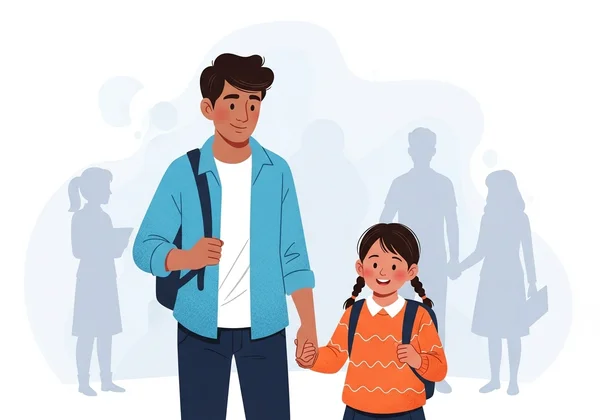ลูกของคุณเป็นออทิสติกหรือไม่? ทำ แบบทดสอบอาการออทิสติกออนไลน์ ของเรา
August 10, 2025 | By Phoebe Harrington
ในฐานะผู้ปกครองหรือผู้ดูแล สัญชาตญาณที่ลึกซึ้งที่สุดประการหนึ่งของคุณคือการทำความเข้าใจลูกของคุณและทำให้แน่ใจว่าพวกเขาได้รับการสนับสนุนที่จำเป็น เพื่อให้พัฒนาไปได้อย่างเต็มที่ หากคุณสังเกตเห็นว่าลูกของคุณมีปฏิสัมพันธ์กับโลกรอบตัวแตกต่างออกไป คุณอาจพบว่าตัวเองนอนไม่หลับในเวลากลางคืน พิมพ์คำถามที่เต็มไปด้วยความกังวลและความรัก: ลูกของฉันเป็นออทิสติกหรือไม่? คุณไม่ได้อยู่คนเดียวในการเดินทางครั้งนี้ เส้นทางสู่ความเข้าใจอาจดูสับสน แต่การก้าวแรกสู่ความชัดเจนสามารถเสริมพลังได้ แบบทดสอบเกี่ยวกับออทิสติก ออนไลน์เป็นวิธีที่อ่อนโยนและเป็นส่วนตัวในการจัดระเบียบการสังเกตของคุณและรับข้อมูลเชิงลึกเบื้องต้น

การทำความเข้าใจและดูแลพัฒนาการอันเป็นเอกลักษณ์ของลูก คือการแสดงออกถึงความรักที่ลึกซึ้ง มันเกี่ยวกับการแสวงหาความเข้าใจ ไม่ใช่การติดป้าย แม้ว่าเครื่องมือออนไลน์จะไม่สามารถให้การวินิจฉัยทางการแพทย์ได้ แต่ก็สามารถเป็นแหล่งข้อมูลอันล้ำค่าเพื่อช่วยให้คุณมองเห็นรูปแบบ เรียนรู้เกี่ยวกับความหลากหลายทางระบบประสาท (neurodiversity) และเตรียมพร้อมสำหรับการสนทนากับผู้เชี่ยวชาญอย่างมีข้อมูลมากขึ้น หากคุณพร้อมที่จะสำรวจลักษณะเฉพาะตัวของลูกของคุณใน สภาพแวดล้อมที่สนับสนุน คุณสามารถ เริ่มต้นการเดินทางของคุณ ด้วยเครื่องมือคัดกรองที่เปี่ยมด้วยความเห็นอกเห็นใจและอิงหลักวิทยาศาสตร์
ทำความเข้าใจลักษณะออทิสติกในเด็ก
โรคออทิสติกสเปกตรัม (ASD) เป็นภาวะพัฒนาการ ที่มีลักษณะเฉพาะและต้องการการสนับสนุนที่หลากหลาย เรียกว่าสเปกตรัมเพราะแสดงออกแตกต่างกันไปในแต่ละบุคคล การทำความเข้าใจใน ลักษณะหลัก ที่มักเกิดความแตกต่างเหล่านี้เป็นก้าวแรกสำหรับผู้ปกครองทุกคน สิ่งเหล่านี้ไม่ใช่ข้อบกพร่องหรือจุดอ่อน แต่เป็นเพียงวิธีการประมวลผลและสัมผัสประสบการณ์โลกที่แตกต่างออกไป
ความแตกต่างในการสื่อสารและการปฏิสัมพันธ์ทางสังคม
หนึ่งในพื้นที่ที่ผู้ปกครองสังเกตเห็นความแตกต่างเป็นอันดับแรกๆ คือ พัฒนาการทางสังคม เด็กที่เป็นออทิสติกอาจสื่อสารและมีปฏิสัมพันธ์ในรูปแบบที่เป็นเอกลักษณ์ของตนเอง ซึ่งอาจรวมถึงความยากลำบากในการตีความสัญญาณที่ไม่ใช่คำพูด เช่น การแสดงออกทางสีหน้าหรือภาษากาย หรือพวกเขาอาจตีความการสนทนาตามตัวอักษรอย่างเคร่งครัด
พวกเขาอาจประสบปัญหาในการเริ่มต้นหรือรักษาบทสนทนาแบบไปกลับ แม้ว่าพวกเขาอาจมีความปรารถนาอย่างลึกซึ้งที่จะเชื่อมต่อกับผู้อื่น การทำความเข้าใจกฎเกณฑ์ที่ไม่ได้กล่าวถึงของการมีปฏิสัมพันธ์ทางสังคมอาจเป็นเรื่องที่น่าสับสนและเหน็ดเหนื่อย สิ่งสำคัญคือต้องมองว่านี่ไม่ใช่การขาดความสนใจในผู้อื่น แต่เป็นรูปแบบการประมวลผลทางสังคมที่แตกต่างออกไป
พฤติกรรมซ้ำๆ และความสนใจที่จำกัด
ลักษณะเด่นของระบบประสาทแบบออทิสติกคือความชอบในความคาดเดาได้และกิจวัตร สิ่งนี้สามารถแสดงออกเป็น พฤติกรรมซ้ำๆ บางครั้งเรียกว่า "การกระตุ้นตนเอง" (stimming) เช่น การตบมือ การโยกตัว หรือการหมุนตัว การกระทำเหล่านี้มักเป็นการปลอบประโลมตนเองและช่วยควบคุมการรับรู้ทางประสาทสัมผัสหรือจัดการกับความวิตกกังวล การกระทำเหล่านี้เป็นกลไกการเผชิญหน้าที่ดีและสำคัญ
นอกจากนี้ เด็กที่เป็นออทิสติกหลายคนจะพัฒนาความสนใจที่ลึกซึ้งและหลงใหลในหัวข้อเฉพาะ สิ่งนี้เกินกว่างานอดิเรกทั่วไป เป็นการจดจ่ออย่างเข้มข้นที่สามารถนำมาซึ่งความสุขอย่างมหาศาลและความเชี่ยวชาญที่ลึกซึ้ง ไม่ว่าจะเป็นไดโนเสาร์ ตารางเวลารถไฟ หรือวิดีโอเกมที่เฉพาะเจาะจง ความสนใจเหล่านี้เป็นแหล่งของความสบายและความแข็งแกร่ง
ความไวต่อประสาทสัมผัสในเด็ก
บุคคลออทิสติกหลายคนสัมผัสประสบการณ์โลก ผ่านการรับรู้ทางประสาทสัมผัส ที่สูงขึ้นหรือลดลง ซึ่งหมายความว่าพวกเขามี ความไวต่อประสาทสัมผัส ที่รุนแรง ห้องที่ดูปกติสำหรับคุณ อาจรู้สึกสว่างจ้าหรือเสียงดังเกินไปสำหรับพวกเขา ป้ายเสื้ออาจรู้สึกคันจนทนไม่ไหว หรือพวกเขาอาจไวต่อความเจ็บปวดหรืออุณหภูมิ น้อยกว่าเพื่อนๆ
ความแตกต่างทางประสาทสัมผัสเหล่านี้ยังสามารถนำไปใช้กับรสชาติ กลิ่น และสมดุล เด็กที่ "เลือกทานอาหาร" อาจกำลังตอบสนองต่อเนื้อสัมผัสหรือกลิ่นของอาหารในรูปแบบที่ทรงพลัง การทำความเข้าใจลักษณะเฉพาะทางประสาทสัมผัสของพวกเขาเป็นกุญแจสำคัญในการสร้างสภาพแวดล้อมที่สะดวกสบายและสนับสนุน

การจดจำสัญญาณเริ่มต้นของออทิสติกตามวัย
แม้ว่าออทิสติกจะสามารถวินิจฉัยได้ทุกวัย แต่สัญญาณบางอย่างอาจชัดเจนขึ้นในช่วงพัฒนาการที่แตกต่างกัน การสังเกตลูกของคุณในบริบทของกลุ่มวัยของพวกเขา สามารถช่วยให้คุณระบุลักษณะเฉพาะเพื่อปรึกษาผู้เชี่ยวชาญได้ โปรดจำไว้ว่าเด็กแต่ละคนมีพัฒนาการตามจังหวะของตนเอง และสิ่งเหล่านี้เป็นเพียงแนวทางทั่วไป
สิ่งที่ควรมองหาในเด็กวัยหัดเดิน (1-3 ปี)
ใน เด็กวัยหัดเดิน สัญญาณเริ่มต้นมักเกี่ยวข้องกับความก้าวหน้าทางสังคมและการสื่อสาร คุณอาจสังเกตเห็นว่าลูกของคุณไม่ตอบสนองต่อชื่ออย่างสม่ำเสมอเมื่ออายุ 12 เดือน หรือไม่ชี้ไปที่วัตถุเพื่อแสดงความสนใจ พวกเขาอาจชอบเล่นคนเดียวหรือมีปัญหาในการเล่น "สมมติ" การหน่วงของพัฒนาการด้านการพูด หรือการใช้รูปแบบคำพูดที่ผิดปกติ เช่น การพูดซ้ำคำหรือวลี (echolalia) ก็สามารถเป็นสัญญาณบ่งชี้ได้เช่นกัน
สัญญาณในเด็กก่อนวัยเรียนและวัยเรียน (4-12 ปี)
เมื่อเด็กๆ เข้าสู่ วัยก่อนเรียน และระดับประถมศึกษา ความต้องการทางสังคมจะเพิ่มสูงขึ้น เด็กที่เป็นออทิสติกอาจพบว่ายากที่จะสร้างและรักษาเพื่อน เข้าใจกฎเกณฑ์ทางสังคม หรือแบ่งปันประสบการณ์ทางอารมณ์กับเพื่อนๆ ความต้องการความสม่ำเสมอและกิจวัตรที่แข็งแกร่ง อาจทำให้การเปลี่ยนแปลง เช่น การเปลี่ยนแปลงตารางประจำวัน เป็นเรื่องที่ สร้างความไม่สบายใจอย่างยิ่ง ความสนใจที่เข้มข้นของพวกเขาก็อาจทำให้พวกเขาแตกต่างจากพฤติกรรมการเล่นของเพื่อนร่วมชั้น
ลักษณะออทิสติกในวัยรุ่น (วัยรุ่นตอนต้น)
ในช่วง วัยรุ่น บริบททางสังคม จะซับซ้อนยิ่งขึ้น วัยรุ่นที่เป็นออทิสติกอาจมีปัญหาในการทำความเข้าใจความแตกต่างเล็กน้อยของภาษาแสลง การประชดประชัน และภาษาเชิงเปรียบเทียบ ช่วงเวลานี้อาจเหน็ดเหนื่อยเป็นพิเศษ และพวกเขาอาจประสบกับสิ่งที่เรียกว่าภาวะหมดไฟจากออทิสติก (autistic burnout) วัยรุ่นบางคน โดยเฉพาะเด็กผู้หญิง จะมีความชำนาญอย่างมากในการ "ปิดบัง" หรือ "อำพราง" ลักษณะเฉพาะของตนเองเพื่อให้เข้ากับผู้อื่น ซึ่งอาจนำไปสู่ความวิตกกังวลและความเหนื่อยล้าทางจิตใจอย่างมาก
ทำไมต้องพิจารณาแบบทดสอบ "ลูกของฉันเป็นออทิสติกหรือไม่"?
คุณได้ทำการสังเกต และคุณมีคำถาม การทำ แบบทดสอบนี้ อาจเป็นก้าวที่สำคัญ มันเป็นเครื่องมือที่ออกแบบมาเพื่อแปลงความกังวลของคุณให้เป็นข้อมูลที่มีโครงสร้าง เพื่อสร้างสะพานเชื่อมระหว่างสัญชาตญาณของผู้ปกครองและการประเมินโดยผู้เชี่ยวชาญ
บทบาทของเครื่องมือคัดกรองออนไลน์: สิ่งที่ทำได้และทำไม่ได้
เป็นสิ่งสำคัญอย่างยิ่งที่จะต้องเข้าใจว่า เครื่องมือคัดกรองออนไลน์ มีไว้เพื่ออะไร มันเป็นเครื่องมือให้ข้อมูล ไม่ใช่เครื่องมือวินิจฉัย แบบทดสอบไม่สามารถบอกคุณได้อย่างแน่นอนว่าลูกของคุณเป็นออทิสติกหรือไม่ มีเพียงผู้เชี่ยวชาญทางการแพทย์ที่มีคุณสมบัติเหมาะสม เช่น กุมารแพทย์พัฒนาการ หรือนักจิตวิทยาคลินิก เท่านั้นที่สามารถให้การวินิจฉัยอย่างเป็นทางการได้ อย่างไรก็ตาม แบบทดสอบที่ออกแบบมาอย่างดีสามารถช่วยให้คุณจัดระเบียบความคิดและตัดสินใจว่าการประเมินโดยผู้เชี่ยวชาญเป็นขั้นตอนที่ถูกต้องสำหรับครอบครัวของคุณหรือไม่

แนวทางที่เปี่ยมด้วยความเห็นอกเห็นใจของเราสำหรับการประเมินตนเอง
บน แพลตฟอร์มแบบทดสอบเกี่ยวกับออทิสติก ของเรา เราเข้าใจว่านี่คือการเดินทางที่ละเอียดอ่อน การประเมินของเราที่อิงหลักวิทยาศาสตร์ เช่น แบบทดสอบ CATQ และ AQ ถูกออกแบบมาให้มากกว่าแค่คะแนน หลังจากทำแบบสอบถามเสร็จ คุณมีตัวเลือกในการรับสรุปผลฟรี หรือปลดล็อกการวิเคราะห์ AI แบบละเอียดและเป็นส่วนตัว รายงานนี้ให้ข้อมูลเชิงลึกเกี่ยวกับจุดแข็ง ความท้าทายที่อาจเกิดขึ้น และลักษณะเฉพาะอาจส่งผลต่อชีวิตประจำวันได้อย่างไร นำเสนอมุมมองแบบองค์รวมและเสริมพลัง
ประโยชน์ของการทำแบบทดสอบเกี่ยวกับออทิสติกเบื้องต้นสำหรับผู้ปกครอง
การทำแบบทดสอบเบื้องต้นมีข้อดีหลายประการ มันเป็น ความลับอย่างสมบูรณ์ และสามารถทำได้จากที่บ้านของคุณเอง ช่วยลดแรงกดดันจากการอยู่ในสถานพยาบาลทันที ผลลัพธ์สามารถให้รายการการสังเกตและคำศัพท์ที่ชัดเจนและเป็นระเบียบแก่คุณ เพื่อใช้เมื่อพูดคุยกับแพทย์หรือนักการศึกษา เป็นก้าวแรกสู่ความเข้าใจที่มีความเสี่ยงต่ำและให้ข้อมูลเชิงลึกสูง หากต้องการรับความชัดเจนเบื้องต้นนี้ คุณสามารถ ทำตามขั้นตอนแรก บนแพลตฟอร์มของเรา
สิ่งที่ควรทำหลังทำแบบทดสอบเกี่ยวกับออทิสติกออนไลน์
การได้รับผลลัพธ์จากแบบทดสอบออนไลน์ไม่ใช่จุดสิ้นสุดของการเดินทาง แต่เป็นจุดเริ่มต้นของเส้นทางใหม่ที่ได้รับข้อมูลดีขึ้น ผลลัพธ์เป็นแหล่งข้อมูลเพื่อชี้นำการดำเนินการขั้นต่อไปของคุณ โดยให้พื้นฐานสำหรับการสนับสนุนและการให้ความช่วยเหลือ
การตีความผลแบบทดสอบของบุตรหลานของคุณ
เมื่อคุณตรวจสอบผลแบบทดสอบของบุตรหลานของคุณ ให้มองว่าเป็นภาพสะท้อนของการสังเกตของคุณ ซึ่งชี้ไปที่ลักษณะที่อาจเกี่ยวข้องกับระบบประสาทแบบออทิสติก คะแนนสูงไม่ได้เท่ากับการวินิจฉัย และคะแนนต่ำก็ไม่ได้ตัดข้อกังวลของคุณออกโดยสิ้นเชิง ใช้รายงานเพื่อทำความเข้าใจรูปแบบต่างๆ และระบุพื้นที่เฉพาะที่ลูกของคุณอาจต้องการการสนับสนุนหรือการปรับเปลี่ยนเพิ่มเติม
ขั้นตอนต่อไป: ปรึกษาผู้เชี่ยวชาญ
หากผลแบบทดสอบบ่งชี้ว่าบุตรหลานของคุณแสดงลักษณะออทิสติกที่เด่นชัด ขั้นตอนต่อไปที่สำคัญที่สุดคือ การปรึกษาผู้เชี่ยวชาญ นัดหมายกับกุมารแพทย์ของบุตรหลานของคุณเพื่อหารือเกี่ยวกับการสังเกตของคุณและผลแบบทดสอบ พวกเขาสามารถส่งคุณไปยังผู้เชี่ยวชาญที่สามารถทำการประเมินพัฒนาการที่ครอบคลุมได้ การประเมินโดยผู้เชี่ยวชาญนี้เป็นวิธีเดียวที่จะได้รับการวินิจฉัยอย่างเป็นทางการ
การค้นหาการสนับสนุนและทรัพยากรสำหรับครอบครัวของคุณ
คุณไม่จำเป็นต้องเดินทางเส้นนี้เพียงลำพัง การเชื่อมต่อกับผู้ปกครองคนอื่นๆ ที่มีลูกเป็นออทิสติกสามารถ เป็นเครื่องยืนยันความรู้สึกและช่วยเหลือได้อย่างมาก ค้นหากลุ่มสนับสนุนในพื้นที่หรือชุมชนออนไลน์ที่น่าเชื่อถือ การเรียนรู้เพิ่มเติมเกี่ยวกับ ความหลากหลายทางระบบประสาท (neurodiversity) ในฐานะแนวคิดก็สามารถเปลี่ยนมุมมองของคุณ ช่วยให้คุณมองเห็นลักษณะเฉพาะของลูกของคุณเป็นจุดแข็งที่ควรได้รับการเฉลิมฉลองและสนับสนุน คุณสามารถ รับข้อมูลเชิงลึกเบื้องต้น เพื่อช่วยเตรียมพร้อมสำหรับการสนทนานั้น

เสริมพลังการเดินทางของบุตรหลานของคุณ: ความเข้าใจและการสนับสนุน
การเป็นผู้ปกครองคือการเดินทางแห่งการค้นพบ เมื่อคุณแสวงหาความเข้าใจใน ลักษณะเฉพาะตัวของลูก คุณกำลังมอบของขวัญที่ยิ่งใหญ่ที่สุดให้แก่พวกเขา: การยอมรับอย่างไม่มีเงื่อนไข การรับรู้ลักษณะออทิสติกที่อาจเกิดขึ้นไม่ใช่การค้นหาสิ่งที่ "ผิดปกติ" แต่เป็นการหาวิธีที่ถูกต้องในการสนับสนุนความสุขและความเป็นอยู่ที่ดีของลูกของคุณ เครื่องมือคัดกรองออนไลน์สามารถเป็นก้าวแรกที่มีประสิทธิภาพและเปี่ยมด้วยความเห็นอกเห็นใจในเส้นทางนั้น
เริ่มต้นเส้นทางสู่ความชัดเจนและการสนับสนุน ทำแบบทดสอบเกี่ยวกับออทิสติกฟรีของเรา วันนี้เพื่อรับข้อมูลเชิงลึกอันมีค่าและเสริมพลังการเดินทางของครอบครัวคุณ ความเข้าใจของคุณสามารถเปลี่ยนแปลงโลกของลูกคุณได้
คำถามที่พบบ่อยสำหรับผู้ปกครองเกี่ยวกับแบบทดสอบเกี่ยวกับออทิสติก
แบบทดสอบออนไลน์สามารถวินิจฉัยออทิสติกในลูกของฉันได้หรือไม่?
ไม่เลย แบบทดสอบเกี่ยวกับออทิสติกออนไลน์เป็นเครื่องมือคัดกรอง ไม่ใช่เครื่องมือวินิจฉัย มันสามารถช่วยระบุลักษณะที่อาจบ่งชี้ว่าบุตรหลานของคุณอยู่ในสเปกตรัมออทิสติกได้ แต่มีเพียงผู้เชี่ยวชาญทางการแพทย์ที่มีคุณสมบัติเหมาะสมเท่านั้นที่สามารถให้การวินิจฉัยอย่างเป็นทางการได้หลังจากการประเมินที่ครอบคลุม
แบบทดสอบ "ลูกของฉันเป็นออทิสติกหรือไม่" เหมาะสำหรับช่วงวัยใด?
แบบทดสอบของเราออกแบบมาเพื่อประเมินลักษณะออทิสติกหลักที่สามารถสังเกตได้ในช่วงวัยที่หลากหลาย อย่างไรก็ตาม วิธีการแสดงออกของลักษณะเหล่านี้อาจเปลี่ยนแปลงไปตามการเติบโตของเด็ก คำถามต่างๆ อิงตามพฤติกรรมและประสบการณ์ ทำให้สามารถใช้ได้ไม่ว่าคุณจะมีเด็กวัยหัดเดินหรือวัยรุ่นก็ตาม แต่การตีความของคุณควรพิจารณาถึงช่วงพัฒนาการของพวกเขาเสมอ
แบบทดสอบ "ลูกของฉันเป็นออทิสติกหรือไม่" ฟรีหรือไม่?
ใช่ การทำแบบทดสอบและรับรายงานคะแนนพื้นฐานผ่าน แบบทดสอบออนไลน์ของเรา นั้นฟรีทั้งหมด เราเชื่อว่าทุกคนสมควรได้รับข้อมูลเชิงลึกเบื้องต้น สำหรับผู้ปกครองที่ต้องการความเข้าใจที่ลึกซึ้งยิ่งขึ้น เรายังมีรายงาน AI แบบละเอียดและเป็นส่วนตัวที่ปรับให้เหมาะกับแต่ละบุคคล ซึ่งมีค่าใช้จ่ายเพิ่มเติม
สัญญาณหลักของออทิสติกในเด็กเล็กคืออะไร?
สัญญาณหลัก เกี่ยวข้องกับสามด้านหลัก: ความแตกต่างในการสื่อสารและการปฏิสัมพันธ์ทางสังคม การมีส่วนร่วมในพฤติกรรมซ้ำๆ หรือกิจวัตร และความไวต่อประสาทสัมผัสเฉพาะ สิ่งเหล่านี้อาจดูเหมือนพัฒนาการล่าช้าด้านการพูด ความยากลำบากในการสบตา ความสนใจที่เข้มข้นในหัวข้อเฉพาะ และการตอบสนองที่รุนแรงต่อเสียง พื้นผิว หรือแสง
ฉันควรทำอย่างไรหากลูกของฉันได้คะแนนสูงในแบบทดสอบ?
คะแนนสูงบ่งชี้ว่าจะเป็นประโยชน์ในการหารือเกี่ยวกับการสังเกตของคุณกับผู้เชี่ยวชาญ ใช้ผลแบบทดสอบเป็นจุดเริ่มต้นสำหรับการสนทนากับกุมารแพทย์ของบุตรหลานหรือผู้เชี่ยวชาญด้านพัฒนาการ รายงานสามารถช่วยให้คุณสื่อข้อกังวลของคุณได้อย่างชัดเจน ในระหว่างนี้ โปรดมอบสภาพแวดล้อมที่เปี่ยมด้วยความรัก การสนับสนุน และการปรับเปลี่ยนสำหรับบุตรหลานของคุณต่อไป คุณสามารถ รับข้อมูลเชิงลึกเบื้องต้น เพื่อช่วยเตรียมพร้อมสำหรับการสนทนานั้น